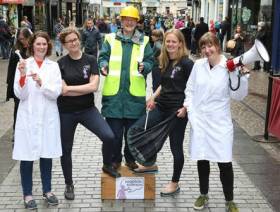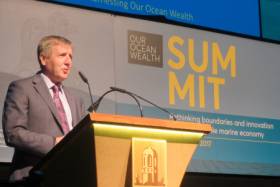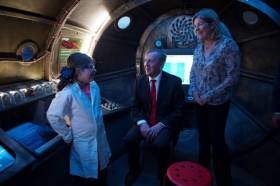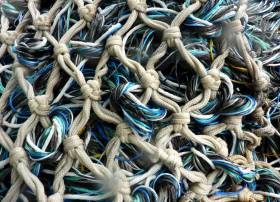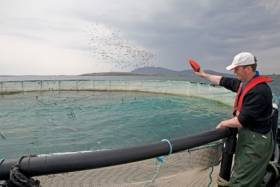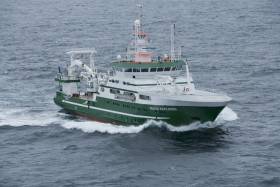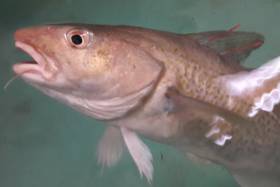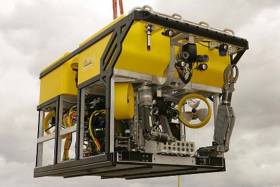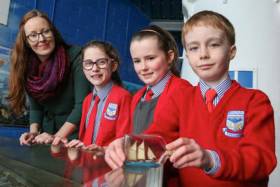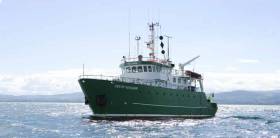Displaying items by tag: Marine Institute
#MarineScience - A postdoctoral researcher with the Marine Institute will join a group of female scientists as they take take to their soapboxes and bring science to the streets of Galway tomorrow lunchtime.
Soapbox Science takes place from 11am to 2pm at the Spanish Arch on Saturday 15 July, with participants sharing with the public their passion for all things science.
This is the first time that Soapbox Science, founded in the UK seven years ago, has come to Galway, with the initiative also set to reach Belfast in 2017.
The event has two aims: to bring science to unexpected locations to give a broader sector of society the opportunity to meet and interact with scientists, and to promote the visibility of women in science.
This year’s talks will cover diverse subjects such as how to make stars, building your own body parts and sustainable fisheries.
Representing the Marine Institute is Dr Debbi Pedreschi, a marine scientist working on finding ways to implement the ecosystems approach to fisheries management.
Speaking ahead of her talk, Dr Pedreschi said: “I appreciate all events that promote science, and women in science, but that most importantly, engage the public.
“Soapbox Science literally ‘takes it to the streets’ and I think that is an amazing initiative and opportunity. It removes all barriers allowing curiosity to peak and conversations to flow.”
Dr Jessamyn Fairfield, Soapbox Science organiser and a physicist at NUI Galway, added: “When many people think of a scientist, they think of a man in a white coat. Soapbox Science aims to challenge this perception by showcasing the work of female scientists in a fun and friendly way.
“In order to keep up with the need for a skilled STEM workforce, the scientific community must continue to attract the best talent, and be open and inclusive. We hope that this event can inspire people to look at science in a different way.”
Soapbox Science speakers and their topics include:
- Prof Laoise McNamara, NUI Galway: Close to the bone: Engineering research into the biology of osteoporosis and implants.
- Dr Rachel Cave, NUI Galway: Help, help, I think my house is dissolving! How ocean acidification works and why it matters.
- Dr Rachel Quinlan, NUI Galway: How to make stars (in two and three dimensions).
- Dr Marie Coggins, NUI Galway: Are you breathing clean air indoors?
- Dr Sharon Glynn, NUI Galway: A new dimension to ancient enemies: What are these hidden viruses in our DNA and how do they contribute to cancer development?
- Dr Heather Teresa Lally, GMIT: How do creepy crawlies adapt to living in a watery underworld?
- Dr Debbi Pedreschi, Marine Institute: The story of sustainable fisheries: solving ‘wicked problems’ and other tales.
- Juhi Samal, NUI Galway: Biomaterial pills for Parkinson’s: saving cells to stop shaking?
- Kirsten Fossum, NUI Galway: Clouds: where do they come from, where do they go?
- Adele Gabba, NUI Galway: The sweet universe of carbohydrates chemistry!
- Fiona Malone, GMIT: Biomedical engineering: build your own body parts.
- Dr Caroline Sullivan, IT Sligo: The Wild Atlantic Way: why it’s so beautiful and how farmers helped create it.
Over 350 women have taken part in Soapbox Science since 2011, with a further 220 participating in the 19 events taking place during 2017.
Over 55,000 people attended Soapbox Science events in 2016, with 85 per cent rating them as enjoyable or extremely enjoyable, and over a third stating it had an effect on their awareness of women in science.
The event is free and open to the public. For more information about Soapbox Science visit soapboxscience.org.
National Marine Research & Innovation Strategy Launched
#MarineScience - The new National Marine Research & Innovation Strategy 2017-2021 aims to fulfil the need for a strategic marine research agenda to promote cross-agency collaboration, says Ireland’s Marine Minister.
Michael Creed welcomed the new strategy during SeaFest 2017, Ireland’s national maritime festival, at the Our Ocean Wealth Summit last Friday (30 June) — at which it was announced that Ireland’s ‘blue economy’ is outperforming the general economy, as previously reported on Afloat.ie.
The strategy was prepared by the Marine Institute on behalf of the Marine Coordination Group, and supports the implementation of Innovation 2020, Ireland’s national Research and Innovation Strategy, which identifies the marine sector as one of eight areas of focus for social progress and the economy.
“This new strategy follows on from Sea Change, the last national marine research strategy published in 2007, and will help ensure that Ireland maintains its position at the forefront of marine research in Europe,” said Marine Institute chief executive Dr Peter Heffernan.
“This strategy will ensure that the outputs of new research and innovation will support Ireland’s quest to generate real socio-economic benefits by reaching the 2020 target of a €6.4 billion ocean economy in a sustainable manner.”
The strategy provides a framework for research funders to assess the impact and likely return to the State from research investment in marine related research themes.
It is also designed to ensure that State support of marine research results in Irish researchers being able to compete at an international level and participate fully in transnational research projects.
Preparation of the strategy included a review of national and international marine related strategies and plans, which identified 15 broad research themes such as energy, transport, biodiversity and bioresources.
Each of these themes were the subject of a detailed review of the research capability in Ireland and the steps required to raise this to meet research requirements of national strategies such as Food Harvest 2025 and the Energy White Paper ‘Ireland’s Transition to a Low Carbon Energy Future 2015-2030’.
Welcoming the publication of the strategy on behalf of the board of the Marine Institute, chair John Killeen said: “We look forward to it informing the institute’s own investments, including our plans to co-fund with other Government agencies and departments on projects in a range of marine related research disciplines.”
The launch of the National Marine Research & Innovation Strategy 2017-2021 at the Our Ocean Wealth Summit was accompanied by the publication of New Connections III (2014-2016), which records the success of the Irish marine research community in competitive EU funded programmes such as Horizon 2020, INTERREG-V and ERASMUS+.
#MarineScience - The combination of serious scientific research being done in and out of Galway as well as the city’s location as an ocean gateway makes it an ideal location to stage an event like SeaFest.
That’s according to Dr Peter Heffernan, CEO of the Marine Institute, who spoke ahead of Ireland’s national maritime festival, which starts today (Friday 30 June) with the fourth Our Ocean Wealth Summit.
Dr Heffernan was in NUI Galway yesterday for Digital Ocean, a one-day conference exploring the potential of ‘blue tech’ now in its second year.
SeaFest, he said, “is happening at a time when Ireland is becoming a global hub for blue technology, with a number of companies providing world-class expertise in specialised areas of the marine sector such as data analytics, marine electronics, and the design and build of offshore vessels.”
Yesterday also saw Bord Iascaigh Mhara’s National Seafood Conference, ‘Winning in a Changing Environment’ take place on the eve of SeaFest 2017, with leading seafood industry experts and commentators focusing on sustainability and innovation and the latest polices shaping the global seafood industry.
Deployment Of Sampling Nets At Bertraghboy Bay In Connemara
#MarineScience - The Marine Institute has begun deployment of bag nets for a scientific sampling of Bertraghboy Bay and surrounding waters in Connemara.
The nets — checked daily, weather permitting — will extend outward from the coast for some 30 metres, perpendicular to the shoreline. They will be clearly marked with brightly coloured buoys (mainly orange) and labeled with Marine Institute identification.
Deployment was set to begin at and around co-ordinates 53°25’19”N, 9°52’52”W this past Monday 26 June and will continue till Monday 21 August, weather dependent. They are being deployed using a small open boat powered by an outboard engine.
The Marine Institute contact for this survey is Dave Jackson at 091 387 200 or 087 699 3259.
#MarineScience - A new marine research cluster is planned for Connemara incorporating the Údaras na Gaeltachta facility at Pairc na Mara currently under development in Cill Chiaráin, NUI Galway’s Carna Campus Laboratories, and an aquaculture site in Beirtreach Buí near Carna.
The Connemara cluster will form part of a national aquaculture research cluster which includes the Marine Institute facilities at Newport, Co Mayo, with the Beirtreach Buí site touted as “an important part of the State’s marine research infrastructure”.
In 2016, the Marine Institute secured EU Horizon 2020 and Science Foundation Ireland funding for a range of research projects that will be carried out in close collaboration with Marine Institute teams in Newport and Galway as well as researchers at the NUI Galway campus in Carna and the Udaras na Gaeltachta facility at Páirc na Mara.
These research projects will include studies on cleaner fish, which are used to control sea lice and other external parasites; animal welfare; and poly culture of shellfish, fin fish and seaweeds to enhance biodiversity and reduce environmental impacts.
The Marine Institute says it has committed funding to create three jobs to run and maintain the Beirtreach Buí aquaculture research site and provide support to marine research teams and projects.
The Beirtreach Buí site is expected to support a number of research projects in the coming years, including the development of integrated multi-trophic aquaculture, which provides the by-products, including waste, from one aquatic species as inputs (fertilizers, food) for another. This research will be in association with project partners in both Irish third-level institutions and partners from other EU states.
The site will also be used to support a major international project TAPAS, which has received €7 million from the EU under Horizon 2020.
The TAPAS project aims to develop cost-efficient management tools and practices for the European aquaculture sector to investigate the limits to fish farming activity in a location, social interactions, potential environmental impacts and any future risks.
The Marine Institute has applied to the Department of Agriculture, Food and the Marine to amend the licence for the aquaculture site at Beirtreach Buí from a commercial to a research license.
This application to amend the aquaculture licence at Beirtreach Buí will involve a reduction in the size of the site, a decrease in the number of licensed structures, from 48 structures to a maximum of 12 cages and 12 smaller structures made up of a combination of long lines and sentinel cages/passive sampling structures.
The amendment also includes a reduction in the level of fish stock at the site from the current level of 100 tonnes to a maximum of 50 tonnes. The amended license will allow for holding a range of fish, shellfish and seaweed species for research purposes. No commercial production will be licensed at the site.
The site was originally used for farming salmon in the 1980s and, in 2010, the aquaculture licence was amended in order to carry out culture trials on cod in collaboration with NUI Galway and Údaras na Gaeltachta.
In 2013 the site was taken over by the Marine Institute to focus on research work on cod and related studies, including research into natural alternatives for antifouling.
The new research licence application will go to public consultation this week.
Take A Virtual Tour On Board The Celtic Explorer
#RVCelticExplorer - Pay a visit on board Ireland’s national marine research vessel wherever you are, thanks to a new immersive 360-degree virtual tour of the RV Celtic Explorer courtesy of the Marine Institute.
Conor Purcell writes in New Scientist on the top attractions aboard the busy marine science vessel, including its wet and dry labs, the tech-filled bridge, its sensor-studded drop keel and even the chief scientist’s cabin.
The RV Celtic Explorer most recently returned from its ‘health check’ of the Atlantic Ocean, which suggests a greater penetration of CFCs in the deeper ocean since the late 1990s.
If this tour whets your appetite, you can still pay a virtual visit to Hook Lighthouse among other coastal locations in Ireland.
Rewards For Capture Of Tagged Irish Sea Cod
#IrishSeaCod - The Marine Institute is encouraging the fishing industry and recreational sea anglers alike to report the capture of tagged cod in the Irish Sea and claim a monetary reward.
Tagging cod in the Irish Sea will enable research agencies in the Ireland the UK to develop a better understanding of cod mortality, abundance, distribution and movement patterns within the Irish Sea and surrounding areas.
Emma White from the Fisheries Ecosystem Advisory Service at the Marine Institute said that with a low population of cod in the Irish Sea, it is vital that this stock is investigated.
:A huge effort will be made to tag several thousand cod in the Irish Sea over the next three years,” said White. “Any reports of the tagged cod will provide useful information to help us better understand the current behaviour of the fish and any factors that may have affected the cod stock.
“Our collaboration with science and industry partners is essential to this project, and together we can build our knowledge and share insights to assist in the recovery of this cod stock in the Irish Sea.”
The project will award €25 for cod captured with a red tag, and €75 for cod with a blue, yellow or pink tag. The cod must be stored whole and ungutted on ice, with the tag in place. The date and location (longitude and latitude) of capture, length of the fish, tag colour and its number should also be recorded.
Tagged cod should be reported to Emma White at the Marine Institute at 091 387 200 or [email protected]. The Marine Institute will organise the collection of tagged cod captured in Ireland.
Cod in the Irish Sea have substantially declined in the last decades. Although the European Commission established measures to aid recovery in 2000, the stock has not responded as expected, and the population of cod in the Irish Sea remains low in 2017.
This three-year project is funded by the European Commission and is a partnership between three research agencies: Marine Institute (Ireland), Agri-Food and Biosciences institute (Northern Ireland) and Cefas, the Centre for Environment, Fisheries and Aquaculture Science (United Kingdom).
More information on the Irish Sea Cod Tagging Project can be found HERE.
Marine Institute Continues to Assist Rescue 116 Recovery
The Marine Institute is working closely with the Coast Guard, the Air Accident Investigation Unit, Commissioners of Irish Lights, Geological Survey Ireland, P&O Maritime Services, the Navy, An Garda Síochána, and local skippers.
The Marine Institute's ROV Holland 1 remotely operated vehicle was deployed from the Commissioners of Irish Lights vessel, the ILV Granuaile. The ROV has high definition cameras, powerful lighting, robotic arms, and has been fitted with other specialist equipment to assist with the operation. It was fitted with a 'ROV homer' provided by the National Oceanographic Centre Southampton, capable of receiving signals from a black box. During a dive on Wednesday 22nd March, the ROV located rescue helicopter R116 on the sea bed on the Eastern side of Black Rock, at a depth of approx. 40m. The ROV acquired extensive video footage of R116 until poor weather conditions required the ROV to halt operations.
Experienced surveyors from the national seabed mapping programme, INFOMAR – a joint Marine Institute, Geological Survey initiative - continue to assist with the operation. The INFOMAR team identified target points for investigation and created 3D and 2D images of the seabed in the search area to help direct the ROV and assist with planning and safety of diver operations.
The Marine Institute will continue to cooperate with the Air Accident Investigation Unit, the Coast Guard, An Garda Síochána, and local persons and agencies to recover the missing crew members.
#MarineScience - Fourth-class pupils from Cregmore National School in Co Galway are creating a marine science and art installation and short film with artist Louise Manifold that re-enacts the 2011 discovery of the Moytirra deep-sea hydrothermal vents.
Build Your Own Unknown sees the school children use images and footage from the ROV Holland I for inspiration to recreate the discovery of the gigantic rock formations, ‘smoking’ lava vents over 10m high, and areas teeming with unusual species new to science at the Moytirra vent field in the Mid-Atlantic Ridge, some 3km below the surface north of the Azores.
Louise Manifold, the local artist leading the project, said: "As an artist I have always been fascinated by relationship between science and cinema, where often our connections to ocean is formed through our childhood imagination, from sci-fi films to childhood games and mythical stories.
“Build Your Own Unknown is not only about understanding our connections to the ocean, but it is about valuing human curiosity, and I am really enjoying the opportunity to work with the pupils of Cregmore to make an amazing piece of work that celebrates this."
Supported through the Marine Institute's Explorers Education Programme and the Tulca OFFshore programme, the marine science/art collaboration is welcomed by Marine Institute chief executive Dr Peter Heffernan.
"This is an innovative opportunity for artists, marine scientists and educators to engage and increase our awareness about the value, opportunities and societal benefits that the ocean provides us,” he said.
"Rediscovering the mystery of the ocean through the eyes of a scientist, the children have been given the opportunity to work with the Institute and Dr Andy Wheeler from UCC, who was the chief scientist on the research vessel RV Celtic Explorer, that had explored and aptly named Moytirra vents after a mythological Irish battlefield meaning plain of pillars.”
Build Your Own Unknown will be on show at SeaFest 2017, Ireland’s national maritime festival from 30 June to 2 July, which will promote the importance of ocean exploration as well as engage the wider community through visual arts.
The project will also include the development of cross-curricular education lesson plans and resources that teachers will be able to use for their own art-science project module. These will be available later this year at www.explorers.ie.
Marine Science Vessel RV Celtic Voyager Joins Search for Missing Coastguard Helicopter R116
The Marine Institute ship RV Celtic Voyager is providing specialist support to assist in a major sea search off the county Mayo coast approximately six miles west of Blacksod to locate an Irish Coast Guard helicopter believed to have entered the sea at approximately 1am on Tuesday 14th March.
The Dublin based search and rescue helicopter R116 had been providing 'top cover' during a medical evacuation of a crewman from a UK registered fishing vessel approximately 150 miles west of Eagle Island in County Mayo, which was completed by Sligo based Coast Guard helicopter R118.
The RV Celtic Voyager is assisting with the search operation this morning approximately six miles west of Balcksod. Marine Institute staff from the INFOMAR team, (the national seabed mapping programme) are assisting with the search using specialist multibeam sonar equipment onboard the national research vessel, RV Celtic Voyager.
The search operation is being coordinated by the Coast Guard Rescue Coordination Centre in Malin Head. The RV Celtic Voyager was diverted yesterday from an undergraduate training survey with GMIT, to assist with the search following a request by the Air Accident Investigation Unit of the Department of Transport. Coast Guard search and rescue helicopters, the Air Corps, Navy, RNLI and a number of local fishing vessels are involved in the search operation.



























